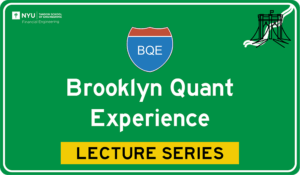
J. Doyne Farmer, Director of Complexity Economics at the Institute for New Economic Thinking at the Oxford Martin School, and Baillie Gifford Professor of Mathematics at the University of Oxford, will give the following talk on Thursday, February 25th at 9:30 AM EST.
*Kindly note that we have changed the time to 9:30 AM on Thursdays. The new time change allows our invited international guests to join these important virtual talks.
Meeting ID: 994 9055 8266
Password: FREBQEDF
Title
How Market Ecology Explains Market Malfunction
Abstract
Standard approaches to the theory of financial markets are based on equilibrium and efficiency. Here we develop an alternative based on concepts and methods developed by biologists, in which the wealth invested in a financial strategy is like the abundance of a species. We study a toy model of a market consisting of value investors, trend followers, and noise traders. We show that the average returns of strategies are strongly density-dependent, i.e. they depend on the wealth invested in each strategy at any given time. In the absence of noise, the market would slowly evolve toward an efficient equilibrium, but the statistical uncertainty in profitability (which is adjusted to match real markets) makes this noisy and uncertain. Even in the long term, the market spends extended periods of time away from perfect efficiency. We show how core concepts from ecology, such as the community matrix and food webs, give insight into market behavior. The wealth dynamics of the market ecology explain how market inefficiencies spontaneously occur and give insight into the origins of excess price volatility and deviations of prices from fundamental values.
Bio
J. Doyne Farmer is Director of Complexity Economics at the Institute for New Economic Thinking at the Oxford Martin School, and Baillie Gifford Professor of Mathematics at the University of Oxford. He is also an External Professor at the Santa Fe Institute. His current research is in economics, including financial stability, sustainability, technological change, and economic simulation. He was a founder of Prediction Company, a quantitative automated trading firm that was sold to the United Bank of Switzerland in 2006. His past research spans complex systems, dynamical systems, time series analysis, and theoretical biology. He founded the Complex Systems Group at Los Alamos National Laboratory, and while a graduate student in the 1970s he built the first wearable digital computer, which was successfully used to predict the game of roulette.
